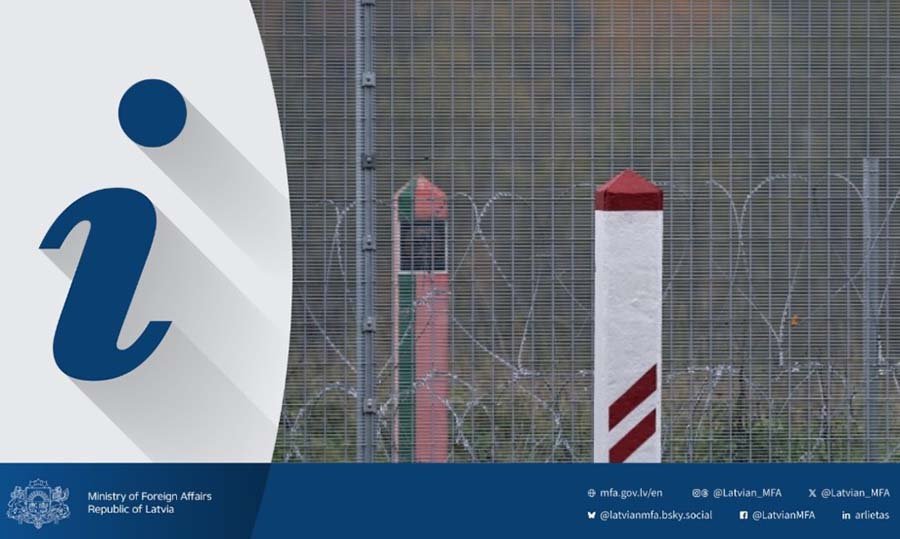European Commission Reviews Complaints on Rights Violations of Russians in Latvia

Photo: mfa.gov.lv
The European Commission has accepted three complaints regarding violations of the rights of Russians in Latvia, reports Diaspora.ru. They concern entry rules, residence permit renewal, and financial requirements for family members of EU citizens. All three complaints were deemed admissible, which is rare and indicates a systemic nature of the problem.
One of the cases involves the new electronic declaration for entry into Latvia, effective from September 1, 2025. The law applies to foreigners who are not citizens of the EU, NATO, OECD, EEA, as well as Switzerland and Brazil. They are required to complete a form on eta.gov.lv at least 48 hours before traveling. After submission, an automatic confirmation is sent by email, and no separate permit is required. Latvia’s Foreign Ministry notes that these amendments were introduced to conduct preliminary national security risk assessments. Failure to submit the declaration results in administrative penalties. The complainant argues that this measure violates Schengen Code provisions and is aimed at pushing Russians out of the country.
Another Russian citizen challenges the requirement by Latvian authorities to present a “valid travel document” when renewing a five-year EU long-term residence permit. Directive 2003/109/EC states that such permits should be renewed automatically. Article 9 lists grounds for losing the status, but possessing a valid or biometric passport is not among them. The complainant stresses that the document is needed only for crossing EU external borders, not for residing within the country. Fines and refusal to extend a permit due to an “invalid passport,” despite holding a valid residence card, violate EU law and the principle of proportionality.
The situation for Russian citizens worsened after Latvia’s July 15, 2025 decision to recognize only biometric Russian passports. At the same time, issuance of passports at the Russian Embassy in Riga is effectively frozen, with no application slots available until late November 2025. For many, traveling to Russia for a new document risks political persecution. Thus, the state creates an insurmountable barrier for residence permit renewal, inventing grounds for refusal absent in EU regulations.
The third complaint concerns financial requirements for foreigners entering Latvia as family members of EU citizens. The website of the Office of Citizenship and Migration Affairs (OCMA) states that “sufficient resources” must be demonstrated, but the exact amount is not specified, making the rule vague and open to arbitrary interpretation. The complainant clarifies that the agency informed him he must prove income not lower than the minimum. In practice, this means not only showing about €8,880 on a bank account but also “freezing” it to remain accessible as proof. According to the complainant, this requirement is entirely disproportionate and contradicts Directive 2004/38/EC, as it turns the right to reside into dependence on significant financial barriers not provided for by law.
For the European Commission, this is a precedent: three complaints from one member state point not to individual mistakes but to systemic non-compliance of national requirements with EU norms. The applicant’s lawyer emphasizes that most such complaints are usually rejected at the admissibility stage, while acceptance of three at once indicates the seriousness of the issue.
Meanwhile, over 840 Russians have already lost their Latvian residence permits. The country’s Citizenship and Migration Service explained that they failed to comply with new rules and did not submit renewal documents. Recall that in summer 2024, amendments came into force requiring Russian citizens to prove knowledge of Latvian and reapply for residence permits. The deadline was set for June 30, 2025, after which permits automatically expired. Those who failed to submit documents have been assigned a voluntary departure date of October 13, 2025. Otherwise, enforcement measures may be applied.
Latvia has also introduced other restrictions for Russians and Belarusians, covering residence permits, visas, and real estate purchases. In addition, several border checkpoints were closed. These measures reflect a broader regional trend: over the past three years, the strictest restrictions on citizens of Russia and Belarus have been implemented in the Baltic States and Poland, where national authorities go beyond EU-wide rules, tightening migration control and limiting entry and residence.








